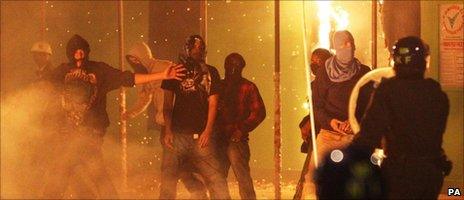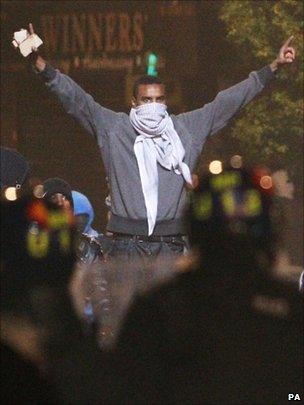England riots: A culture of voyeurism
- Published
- comments

"Jog on" was a new expression to me.
I hadn't heard it before this week's riots, but now realise it is a widely used phrase meaning "push off".
I checked it out online where one site attributed its emergence to a film called The Football Factory (2004). I went and bought a copy.
The main character in the film (played by Frank Harper) does indeed say "jog on" (three times I think). He is the most thuggish of the football thugs in a film about football thugs based on a book with the same name by John King.
When the thug says "jog on" it is laced with a menace and arrogance that coarser and familiar terms lack.
On the front cover of the DVD there is a quote from GQ's review of the film that reads "Happy Hour measures of violence, drugs, drinking, thieving, sex and profanity". Depends on your view of a happy hour I suppose.
I was interested to see during the opening titles that Rockstar Games has a major production credit. That's unusual. Rockstar Games are better known for making computer games not movies. Their most famous product is probably Grand Theft Auto: a violent urban crime game that has sold many millions of copies.
The Football Factory and Grand Theft Auto are both pieces of contemporary entertainment that play to our fascination with youth-orientated urban crime.
It is a recognised genre that is embedded in business plans across record companies, book publishers and TV and film production companies.
It's not a new fad. The 70s, 80s and 90s all had their equivalents. And even when pop was at its most poppy, the glam rock band The Sweet was enjoying great commercial success with their song Teenage Rampage, with an opening verse that went:
"All over the land

The kids are finally startin' to get the upper hand
They're out in the streets, they turn on the heat
And soon they could be completely in command
Imagine the sensation of teenage occupation
At thirteen they'll be learning
But at fourteen they'll be burnin'
But there's something in the air
Of which we all will be aware
But they don't care,
no, no, no, no... so
Come join the revolution, get yourself a constitution
Come join the revolution now"
That was nearly forty years ago. Current viewing figures and record sales suggest that our appetite for stark images of urban violence, disorder and aggression have not abated.
Even graffiti, once seen as a sure sign of a degenerate society, has now become a must-have fashion accessory among those who care about fashion accessories. Last year the Prime Minster gave a painting by a British graffiti artist to President Obama, as (I assume) a coded message about the hipness of contemporary Britain.
Britain doesn't look so hip now. It might be titillating consuming all this urban violence and 'street culture' one (or several) step(s) removed, but you could say that, as with pornography, life is often a lot less entertaining for those who are caught up in the harsh realities.
This week's riots were a reminder that there is a real-life cast providing the source material for all that pernicious content we seem to be so keen on.
The arts and life are not separate entities; they are the same thing.
The better the work of art - play, film, book or painting - the closer to the truth it is.
When a rapper sings about life on the street it is entirely valid, even if it is unpalatable to some ears.
But there is something much more unpalatable about entertainment companies peddling content designed to amuse that trades on the misery of the less well off. That is not art.
Jog on.